Thomas Lynch, Jr. of South Carolina: Planter, Company Commander, Second Continental Congress Delegate, and Declaration of Independence Signer
Thomas Lynch, Jr. (August 5, 1749 – late 1779), of Irish descent, was born in Prince George’s Parish (present day Georgetown County). Lynch was the son of Thomas Lynch and Elizabeth Allston Lynch. His mother died when he was a young child. He was educated at Georgetown’s Indigo Society School and earned honors at England’s Eton College and Cambridge. He studied law and political philosophy at London’s Middle Temple, like the other South Carolina Declaration of Independence signatories, Edward Rutledge, Thomas Heyward, and Arthur Middleton.
In South Carolina on the eve of the Revolution, Lynch enjoyed the life of a planter, farming and discussing politics, rather than practicing law as his father hoped he would along with becoming engaged in public life, after having received a good education and studying law. He allied himself with figures such as Charles Cotesworth Pinckney, Christopher Gadsden, Arthur Middleton, and Thomas Heyward, Jr. He was a staunch advocate of South Carolina’s right to form its own independent government, regardless of the wishes of the other British colonies. He found the talk by the British politicians distasteful toward the colonists which served to strengthen his views for supporting independence.
In 1772, Lynch married his longtime sweetheart, Elizabeth Shubrick. Elizabeth’s sister, Mary, married one of the other South Carolina signers, Edward Rutledge, after Edward’s first wife, Henrietta, passed away.
He soon after became involved in public service as his father had encouraged him to do, having served in South Carolina’s First and Second Provincial Congresses, and on the state constitutional committee. During these roles, he was commissioned in the First South Carolina Regiment as a company commander in the summer of 1775.
Eventually Thomas Lynch, Jr. was appointed to the Second Continental Congress where his father, Thomas Lynch, Sr. was also serving. Thomas Lynch, Sr. was known and respected as an effective statesman for working with George Washington and influencing the appointment of Washington to the Continental Army as Commander-in-Chief.
Although he was ill as was his father, Thomas Lynch, Jr. signed the Declaration of Independence the following year in 1776, having stood in for his father, Thomas Lynch, Sr., who was unable to represent South Carolina by the time the vote for independence would be taken, and the signatures placed. Lynch was one of the youngest of the South Carolina signers, said to be in his twenties.
Having resigned his commission in 1776, and plagued with bad health, Lynch and his wife eventually sailed to the West Indies for a change in climate in late 1779 as advised by physicians, in hopes of restoring his health. The vessel was reported as lost, and the young signatory and his wife died childless, unfortunately having disappeared at sea, as the Revolution raged.
 J. Edward Lee, Ph.D., is Professor of History at Winthrop University. Lee is a former mayor of the City of York, South Carolina.
J. Edward Lee, Ph.D., is Professor of History at Winthrop University. Lee is a former mayor of the City of York, South Carolina.
 Podcast by Maureen Quinn.
Podcast by Maureen Quinn.
Click Here To Sign up for the Daily Essay From Our 2021 90-Day Study: Our Lives, Our Fortunes & Our Sacred Honor
Click Here To View the Schedule of Topics From Our 2021 90-Day Study: Our Lives, Our Fortunes & Our Sacred Honor



Join the discussion! Post your comments below.
Your feedback and insights are welcome.Feel free to contribute!